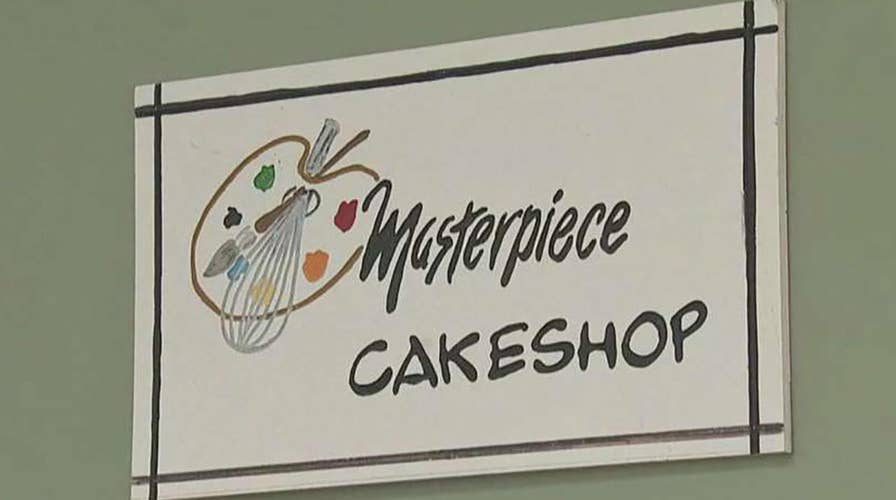Supreme Court to hear arguments on bakery case
Legal panel weighs in on high profile religious liberty issue.
On Tuesday the Supreme Court of the United States will take up what may be the most portentous case we’ve seen in a generation: Masterpiece Cakeshop v. Colorado Civil Rights Commission, a dispute predicated on whether a baker should be compelled by the state to offer a wedding cake to a same-sex couple.
Never before have so many reams of amicus briefs seeking to sway our judicial branch been devoted to dessert—indeed, at times the churn of documents arguing for and against the petitioners seem more like cookbooks than juristic tomes. They all seek a diametric resolution in the matter: You must either bake the wedding cake, or not. In the eyes of LGBT and free speech/religious liberty advocates alike, it’s a zero-sum game—but it doesn’t have to be.
There are three alternative ways to thread the needle on this issue that afford same-sex couples dignity, respect the consciences of people of faith, and give all sides breathing room as America grows ever-more accepting of same-sex marriages.
WITHOUT WORDS, IT’S JUST A CAKE
The center-right’s recurring argument in the Masterpiece case is that Charlie Craig and David Mullins, the respondents in the case, could just have taken their business elsewhere when Jack Phillips declined their request for a wedding cake (indeed, ultimately they did, obtaining a cake from a different vendor with a “rainbow layer” to make a “political statement”). But Phillips could just as easily have sold them a cake off the shelf that Craig and Mullins could have had decorated elsewhere. When the shoe was on the other foot and the proprietor of a bakery in the same state as Masterpiece Cakeshop was asked to create a cake shaped like a bible with the words “Homosexuality Is A Detestable Sin,” the owner obliged! She offered to make the cake, but drew the line at writing the text, offering instead to let the purchaser do so himself.
CHURCH-BASED SERVICES
Writing for the Daily Beast (hardly a bastion of conservative thought), Jay Michaelson (hardly a poster-boy for conservative columnists) recently proposed the idea that vendors with objections to same-sex marriage tether their wedding-related services to events directly associated with specific churches. Such a compromise, Michaelson states, would nullify the argument that if you make cakes for any heterosexual union, you must do the same for any same-sex union by tying products and services to a location (specifically one with a ministerial exception) rather than an event.
Michaelson concludes that the amped-up voices on both the plaintiff and respondent sides would never agree to such a détente—at least for now. If the Supreme Court somehow threads the needle on this case with a limited ruling or punts to rule on something more comprehensive at a later time, this angle could well end up being embraced as the de facto route private businesses go in relation to this issue.
WEDDING EXEMPTION
For years marriage equality advocates—myself included—told same-sex marriage skeptics to “trust us”—that legally recognized gay unions would be no threat to them, their family, or their faith. It’s a soundbite that has taken support for marriage equality to record highs (64 percent as of the most recent polling). But that trust erodes significantly when former opponents who became reluctant supporters suddenly do feel that their way of life is under attack. The solution is an exemption for wedding-related services.
A wedding exemption is not the same as a marriage exemption; allowing providers of goods and services the option to opt out of wedding ceremonies and receptions (and only those) without allowing businesses to withhold services citing more broad “moral objections” to same-sex unions promoted in bills such as the so-called “First Amendment Defense Act” opposed by Log Cabin Republicans.
This solution would need to be achieved legislatively unless the Supreme Court contorts its ruling in such a fashion as to achieve this end on its own (one need look no further than the Court’s infamous 2012 ObamaCare ruling to see that this outcome is more conceivable than one may think).
Following the achievement of nationwide marriage equality, I urged advocates to adopt a compassionate stance with those still on the fence in order to promote “productive, meaningful dialogue and mutual understanding.”
That was a mere two years ago. Patience is still needed—although it seems in short supply. A nuanced resolution to this dramatic debate would prevent descent into a contentious culture war that could last for decades.
Here’s hoping the Supreme Court, supported by free markets and people of good will, finds a third way.

